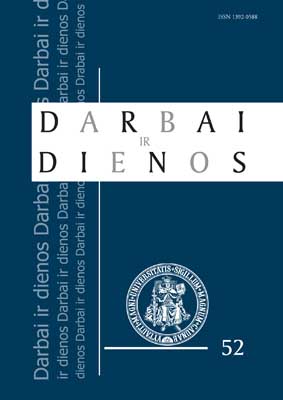Isaiah Berlin and radical empiricism
Isaiah Berlin and radical empiricism
Author(s): Mykolas DrungaSubject(s): Cultural Essay, Political Essay, Societal Essay
Published by: Vytauto Didžiojo Universitetas
Keywords: Isaiah Berlin; epistemology; radical empiricism; phenomenalism; epistemologija; radikalus empiricizmas; fenomenalizmas;
Summary/Abstract: I first heard of Isaiah Berlin sometime in the late 1960s when I was studying philosophy at the University of Chicago and became interested in the problems of epistemology. There was a beautiful anthology of the best recent articles on this subject, or at least as restricted to sense-perception which turned out to be what I was most interested in. This anthology, published in 1965, was edited by Robert J. Schwartz and called Perceiving, Sensing, and Knowing; and it contained the paper “Empirical Propositions and Hypothetical Statements” by Isaiah Berlin, originally published in Mind in 1950. This is the paper I’ll touch on here, but first I want to say that only much later did I realize all of the following: that Isaiah Berlin wasn’t just a run-of-the-mill analytic philosopher discussing problems of empiricism; that in fact epistemology was just one of his many interests; that actually there are no less than two Berlins; and that the more important one, at least in his own eyes from the 1950s onwards and certainly those of posterity, was the one we’ve been mainly discussing at this confe rence so far: that is, Isaiah Berlin the philosopher of history and the historian and critic of political, social, and cultural ideas; something he was very good at, probably better than anyone else in the middle of the last century and trained in the British analytic philosophical tradition. Nors I. Berlinas (1908–1997) svariausiai pasireiškė kaip istorijos filosofas ir filosofijos, kultūros ir visuomenės idėjų istorikas bei kritikas, jis paliko ryškių pėdsakų ir empirinio pažinimo teorijoje. Kai kuriuos iš jų šiame straipsnyje ir apžvelgiame. Vadovaudamasis britų analitinės filosofijos metodais Berlinas kritikavo loginį pozityvizmą ir ypač fenomenalizmą, kitaip dar vadinamą radikaliuoju empirizmu. Pastarasis – tai tezė, kad teiginius apie išorinius, fizinius reiškinius galima išversti į tam tikrus teiginius apie psichinius, dvasinius reiškinius. Straipsnyje aptariamos problemos, su kuriomis susiduria kai kurie bandymai, įskaitant Berlino, radikalųjį empirizmą pakirsti. Baigiama išvada, kad jeigu, priešingai Berlinui, nenorima metafizinio idealizmo atsisakyti, būtina ieškoti sveiko proto kritikai atsparesnių radikaliojo empirizmo variantų.
Journal: Darbai ir dienos
- Issue Year: 2009
- Issue No: 52
- Page Range: 9-16
- Page Count: 8
- Language: English

